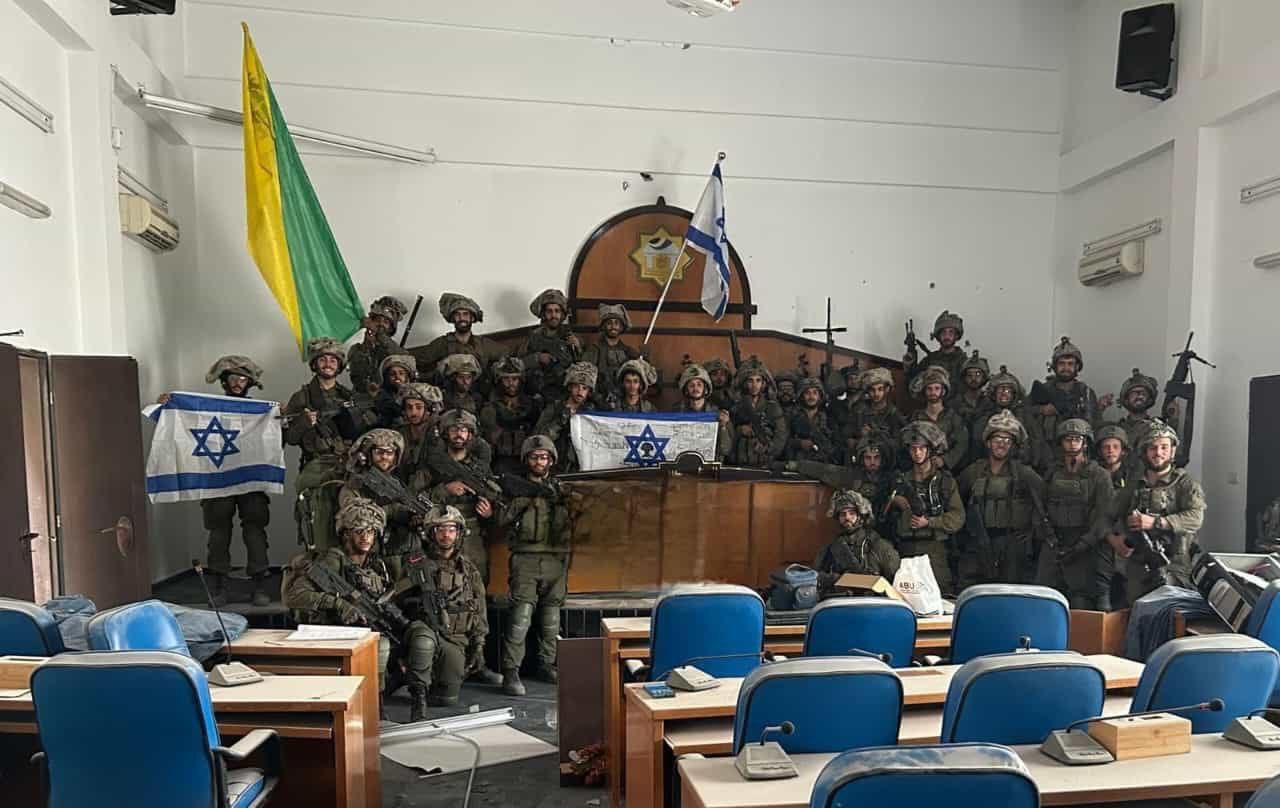Lately there hasn’t been a lot of hard news about Israel’s progress in destroying Hamas. But this is a watershed moment: Israeli soldiers pose in Hamas’s “Parliament” building, which they have captured:

Defense Minister Yoav Gallant describes the campaign’s progress:
“There is no force of Hamas capable of stopping the IDF. The IDF is advancing at every location. The Hamas organization has lost control in Gaza: Terrorists are fleeing south, civilians are looting Hamas bases. They have no confidence in the government,” Gallant said, after holding an assessment on the fighting.
One sign of Israel’s progress is a dramatic drop-off in the number of rockets that Hamas is able to fire.
Naturally, the European Union is eager to slow Israel down:
The European Union has delegated too much of the Israeli-Palestinian peace process to the United States and must now be more involved in a two-state resolution to the conflict, the bloc’s foreign policy chief Josep Borrell told reporters in Brussels on Monday.
“We have been far too absent,” Borrell said ahead of his anticipated trip to Israel and the Palestinian territory in the West Bank this week. …
“We must commit ourselves to this process because if we don’t find a solution, we will experience a perpetual cycle of violence moving from generation to generation from funeral to funeral.”
***
There can be no forced displacement of Palestinians to territory outside of Gaza, no reduction in the territorial scope of Gaza for Palestinians and no reoccupation by the Israeli Defense Forces, Borrell said.
It is true that the conflict between Israel and the Palestinians can be described as a cycle of violence that has now continued for decades. But why is that?
Consider World War II, for example. The Germans and Japanese started the war, but did it lead to a cycle of violence? No. The war’s conclusion brought about a peace that continues to this day, as far as those combatants are concerned. Why is that? Because the war had a decisive result. Germany and Japan were crushed. There were millions of civilian casualties. The German and Japanese people understood that they had lost the war, and the war had been a catastrophe for them. They had no desire to renew the violence.
One can contrast that with World War I, which did not have a decisive result, and which did become part of a cycle of violence, i.e. World War II, precisely because the German people did not accept that they had lost the Great War.
Or consider the Napoleonic Wars. There was a cycle of violence that began with the French Revolution and continued intermittently until 1815. The cycle ended when France was decisively defeated in 1815, and was occupied for a time by the victorious powers. France suffered terribly, and the result was more than a half century of peace.
Then there is the Middle East. Israel fought a series of wars in 1948, 1967 and 1973 against Arab coalitions including Egypt, Jordan, Syria, Lebanon, Saudi Arabia and Iraq. There was, for a time, a cycle of violence. But the Arabs’ attacks failed decisively, and the hostile Arab powers eventually decided to give up on their ambitions and make peace. Several decades have now gone by without armed conflict between Israel and Egypt, Jordan or Syria.
Not so with the Palestinians, i.e., the Arabs who live in the former British Mandate. They have continued to launch terrorist attacks and wars against Israel from 1948 to the present, most recently and most horrifically last month. Why is that? Most fundamentally, because the Palestinians do not believe that they have been defeated by Israel. On the contrary, they–especially the Gazans–seem to have believed that they were doing pretty well. Intifada was good to them, yielding vast quantities of international aid and considerable international respect.
In my view, the approach taken by the E.U. and by Palestinian sympathizers in the U.S. is precisely wrong. If there is a cease fire, another tenuous “peace,” ongoing yammering about a two-state solution that the Palestinians have rejected over and over again, the cycle of violence will continue. The only thing that will stop it is a victory by Israel so crushing that Palestinians acknowledge they have been beaten, lay down their arms, and repudiate their leaders.
So we can only hope that Israel will ignore the voices of compromise and press on to a thorough and decisive victory that will end the cycle of violence once and for all.

